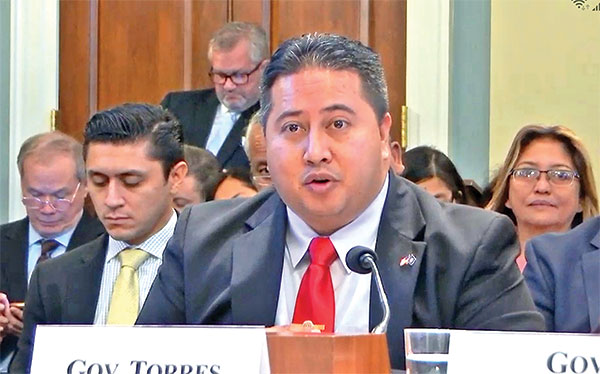‘NMI must grab every opportunity’

Gov. Ralph DLG Torres is shown here in a screen grab photo from yesterday morning’s U.S. House of Representatives Natural Resources Committee hearing in Washington, D.C. (Contributed Photo)
Gov. Ralph DLG Torres, in his second straight day testifying in a legislative hearing, told members of the U.S. House of Representatives Natural Resources Committee that CNMI officials like him must always take every opportunity to inform the federal government of the challenges that territories like Commonwealth are facing.
Torres, along with Guam Gov. Lou Leon Guerrero, Office of Insular Affairs director Nickolao Pula, U.S. Government Accountability Office International Affairs and Trade director Dr. David B. Gootnick, and Northern Marianas Business Alliance Inc. president Michael S. Sablan, testified in Wednesday’s (early Thursday morning on Saipan) hearing for H.R. 560.
CNMI Delegate Gregorio Kilili C. Sablan (Ind-MP), the vice chairman for Insular Affairs, introduced H.R. 560 that aims to give improved status to individuals who were affected by the decision of United States Citizenship and Immigration Services to discontinue the CNMI categorical parole in December.
Those who are affected of USCIS’ decision are spouses and immediate relatives of citizens of Freely Associated States and spouses or IRs of U.S. citizens; parents of U.S. citizen children who are either under or over 21 years old; CNMI permanent residents, and stateless individuals.
Torres said the CNMI’s complex transition to the U.S. immigration system is an ongoing issue. “Since my last testimony before this committee, much has transpired in the CNMI’s efforts to hire more U.S. workers, reduce our dependency on foreign workers, create an even playing ground for all workers to compete in, and create a viable economy in the Western Pacific.”
He then thanked the committee members for supporting the Northern Mariana Islands U.S. Workforce Act of 2018, which extended the CNMI-Only Transitional Worker Visa program. “This has provided much needed relief from the impending termination date of the CW-1 program and permitted the economy to continue to survive.”
“This year would have seen half of the CNMI’s workforce leave the island and a collapse of the economy if action was not taken. For this reprieve, and for your understanding of the unique circumstances facing our Commonwealth, thank you.”
However, he has again faced the committee with almost the same problem. “We are here once again to discuss necessary amendments to the immigration provisions of our Covenant. The CNMI has just experienced the worst typhoon to hit our shores in generations. In fact, it was the strongest such storm to hit the United States since 1935. Winds exceeded 185 miles per hour.”
“There is still much work to be done at home, but I feel it is necessary to be here to discuss this issue because we must take every opportunity we have available to us to spread the understanding that the needs of the CNMI people, are unique within the United States. We face challenges with geography and demographics that magnify our constraints, and we must deal with these challenges with far fewer resources.”
Torres said provisions in H.R. 560 recognizes the CNMI’s unique characteristics and the complex history that led to the community that it was today. “It highlights the fact that the transition period put into place in 2008 [Consolidated Natural Resources Act] is a work in progress in creating a system that avoids adverse impacts to our people.”
He added that the CNMI lives on the effects made by the actions of the U.S. Congress. “We must deal with the decisions of our forbearers who crafted the Covenant, and their negotiated agreement to allow the young government of the Northern Mariana Islands the ability to grow its economy through local control of immigration.”
“We live with the intended and unintended consequences of Public Law 110-229, which took that control away. And it is our responsibility to do what is right in the effort to meld three decades of local control with 10 years of experience within the transition period. To me that is what H.R. 560 works to accomplish.”
Torres said that the transition period stated in the CNRA almost 11 years ago is not the finished product. “That we share in the responsibility to recognize areas of additional concern and rectify them in good faith with the best interest of the people of the CNMI in mind. The solutions presented in H.R. 560 are important but only comprise a piecemeal effort to respond to the unintended consequences of the transition period.”
Torres has also testified with Leon Guerrero and the governors of Puerto Rico (Ricardo Roselló and the U.S. Virgin Islands (Albert Bryan) in the Senate Energy and Natural Resources Committee hearing chaired by Sen. Lisa Murkowski (R-AK).























